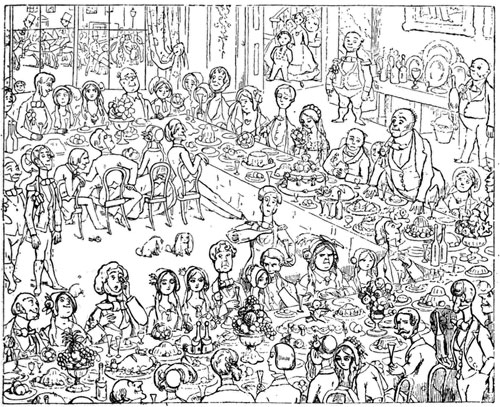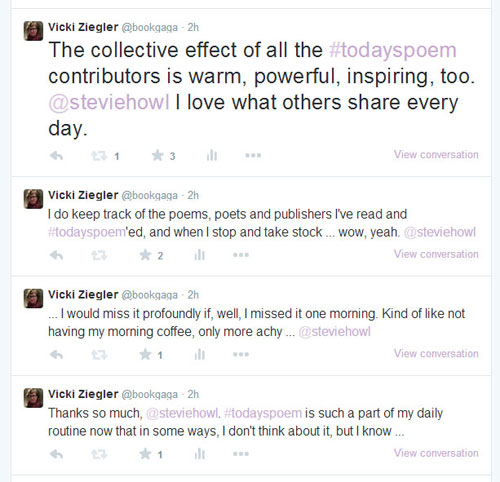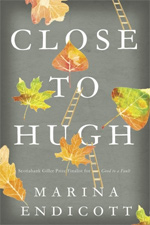
Here are the books I read in 2015, with links to reviews (here on this blog or on Goodreads) where I have them. (I confess that I didn’t get many books fully reviewed this past year. I’ll try to improve in that department in the upcoming year.) As I’ve done in previous years, this is an exhaustive, “all of” list, not a “best of” list.
I continued my commitment in 2015 to a daily devotion to at least one poem … and usually more, as friends on Twitter continued to generously share their poem choices and reflections via the #todayspoem hashtag. Now four years in, I haven’t missed a day, both contributing and enjoying selections from others in this edifying and vital communal experience. I’ve now pondered the works of well over 800 unique poets, writers, songsmiths and wordsmiths I’ve revisited or unearthed myself, and countless more via others wielding that often revelatory hashtag. On into its fifth year, I’m continuing with my #todayspoem habit every day heading into 2016, and I hope many will continue or join anew.
I also celebrated some uniquely beautiful books in 2015, including:
Here are the books I read, reread and read aloud in 2015. Wherever I go, I try to carry a book with me, so for each book, I’m also going to try to recall where I was when I was reading it.
-
The Gallery of Lost Species
by Nina Berkhout
(reread)I read this book at my desk in my home office, as I prepared the readers’ guide / book club questions for this book, offered by House of Anansi Press.
-
Mrs Killick’s Luck
by Christina FitzgeraldAs this book is in somewhat delicate condition, I never took it out of the house. I read this book at my desk in my home office and at the dining room table.
-
Hard Light
by Michael Crummey
(reread)I toted this book everywhere – on the subway, on the streetcar, in coffee shops while waiting to meet up with friends.
-
Fire and Air
by Erik Vlamincky, translated by Paul VincentThis is another book I recall reading on transit.
-
The First Bad Man
by Miranda JulyNot only did I take this book with me on transit, but I was finishing the last few pages as I took the subway to see Miranda July at an Appel Salon event at the Toronto Reference Library.
-
10:04
by Ben LernerI was so wrapped up in this book that I had it with me when we went to see The New Pornographers at the Danforth Music Hall in early February, and I was reading it before the show started.
-
Life is About Losing Everything
by Lynn CrosbieI was definitely reading this book on the subway.
-
The Devil You Know
by Elisabeth de MariaffiI read this book several times on the subway, including when I went to the Rowers Reading Series to hear Elisabeth de Mariaffi read from it. (She read a section I’d already read, if I recall correctly …)
-
Into the Blizzard
by Michael Winter
(read aloud)This book was our (my husband and I) read aloud book over winter 2015. Typically, I read aloud while my husband concocts wonderful dinners for us – he’s an amazing chef. So, most read aloud time is in our cozy kitchen, around the cooktop island, accompanied by a glass or two of wine.
-
Breathing Lessons
by Andy SinclairBoth the engrossing story and the neon book cover brightened up a few subway rides.
-
Backup Singers
by Sommer BrowningI remember reading this poetry collection in the kitchen and at the dining room table.
-
Her Red Hair Rises With the Wings of Insects
by Catherine GrahamI took this poetry collection with me on a few errands, and I recall dipping into it while in the vet clinic waiting area, for example.
-
Safely Home Pacific Western
by Jeff LatosikThis poetry collection accompanied me on several subway rides.
-
The Amazing Adventures of Kavalier & Clay
by Michael ChabonI read this book in my home office as I followed along online as part of the One Book, One Chicago reading sprints. The Amazing Adventures of Kavalier & Clay is a lively, addictive read perfectly suited to that participatory format. Our dog Fionn was often my company during reading sprints.
-
My October
by Claire Holden RothmanI recall reading this book on a restaurant patio on a surprisingly warm spring evening while waiting for a friend.
-
The Road In Is Not The Same Road Out
by Karen SolieI won a copy of this at the Anansi Poetry Bash, and started reading it on the subway ride home that very evening.
-
Human Voices
by Penelope Fitzgerald
(reread)This is another delicate book not allowed out of the house. I recall reading it snuggled in my favourite reading chair and in bed.
-
A Serious Call
by Don ColesI recall that this poetry collection was my calming companion when I got stuck on the subway for a protracted delay one evening.
-
One Night in Mississippi
by Craig ShreveI distinctly remember reading this book at the cottage in early spring.
-
Close to Hugh
by Marina EndicottI got in some late spring/early summer porch reading with this wonderful book.
-
Daddy Lenin and Other Stories
by Guy VanderhaegheI remember reading this book in the comfy reading chair in our loft bedroom at the cottage.
-
I Shall Not Hate / A Gaza Doctor’s Journey
by Izzeldin AbuelaishI recall the bright sunshine at the cottage contrasting sharply with this somber but ultimately inspiring book.
-
Something Crosses My Mind
by Wang Xiaoni, translated by Eleanor GoodmanI remember reading this poetry collection both at the cottage and at home.
-
Tell
by Frances ItaniI definitely remember reading this book while relaxing on the dock at the cottage. In fact, I was so engrossed in it at one point that when I glanced up, a loon was swimming very close to the dock.
-
Just Kids
by Patti SmithThis is another book I gobbled up while relaxing on the dock at the cottage.
-
Where Did You Sleep Last Night
by Lynn CrosbieI vividly recall reading a large chunk of this book on a long drive home from the cottage.
-
Split
by Libby CreelmanI read this book at the cottage, on the dock, on a sunny rock, and indoors when the bugs were fierce.
-
Loving Day
by Mat JohnsonWhen I’m alone at the cottage, I read while I’m eating. I recall reading this book at the cottage dining room table, with sunlight trickling in through the trees at the front of the cottage, with the pages of the book propped open with a chunk of quartz that I keep expressly for book-propping-open purposes.
-
The Green Road
by Anne EnrightNot only did I savour this book while alone at the cottage, but I had a wonderful discussion about it with one of my cottage neighbours while walking the dogs one morning.
-
Wrapped in Plastic – Twin Peaks
by Andy BurnsI have very fond and vivid memories of reading this book, accompanied by a mini binge watch of Twin Peaks on DVD, over a few rainy days alone at the cottage. I set up a portable DVD player in the loft bedroom, curled up in a comfy chair with book, popcorn and bourbon, and had myself a wonderful, spooky time with Agent Cooper et al.
-
Daydreams of Angels
by Heather O’NeillI remember reading this book in the waiting room at the doctor’s office. I’m always very glad to bring my own reading material to waiting rooms …
-
What You Need
by Andrew ForbesI definitely recall reading this book on a number of subway and streetcar rides.
-
Fifteen Dogs
by Andre AlexisThis book was another much appreciated transit companion … although the book rendered me verklempt more than one in public.
-
Outline
by Rachel CuskThis book was my travel companion on a sunny autumn day when I took the subway to Harbourfront for Word on the Street, then took the Spadina streetcar and subway to the High Park Reading Festival, and then took the subway home in the evening when the High Park poetry readings were over.
-
Martin John
by Anakana SchofieldIs it kind of ironic that I read this book on the subway?
-
Malarky
by Anakana SchofieldThis book was another constant transit companion.
-
Arvida
by Samuel Archibald, translated by Donald WinklerI carried this book with me to and fro on the subway to International Festival of Authors (IFOA) events, and often read it between events, too.
-
Sideshow Concessions
by Lucas CrawfordIn addition to Arvida, I also had this poetry collection with me during IFOA visits. Before a reading, I recall sitting upstairs in the Queens Quay building, gazing out at Lake Ontario, reading a few poems from this collection, alternating with stories from Arvida.
-
How You Were Born
by Kate CayleyI remember purchasing this very fine short story collection at IFOA. I remember reading it during a wintry visit to the cottage.
-
Twoism
by Ali BlytheI distinctly recall reading this poetry collection on the subway, and getting a look from a young woman across from me of that special recognition that readers give each other.
-
The Good Dark
by Ryan Van WinkleThis poetry collection was another fine transit companion.
-
His Whole Life
by Elizabeth HayI tend to drift off after just a few pages when I read in bed, but this book held my attention and often kept me awake, but in a good way.
-
Dear Leader
by Damian RogersI distinctly recall reading this poetry collection while sitting in a pub, having a beer and waiting to meet my husband for dinner. I was especially grateful to have those poems for company, as all the screens in the pub, which normally showed sporting events, were all tuned to some infuriating and violent breaking news about which I’d had enough.
-
Makarska
by Jim BartleyThis novel was an excellent and absorbing subway companion during a week when I had a lot of appointments, meetings and errands to run.
-
Confidence
by Russell SmithI was reading (and being charmed by) this book at a restaurant while waiting to meet a friend for dinner, followed by the Tafelmusik rendition of Handel’s Messiah at Koerner Hall.
-
A Whole Life
by Robert SeethalerI was reading this book as we drove from Toronto to Kitchener on Christmas morning to visit with family.
Heading to @miranda_july event tonight, I was reading the last few pages of quirky, gorgeous, sweetly wrenching The First Bad Man.
— Vicki Ziegler (@bookgaga) January 30, 2015
This tea and #poetry afternoon break could become a habit … (cc @vagtalk) pic.twitter.com/iJQGyKVdeJ
— Vicki Ziegler (@bookgaga) February 28, 2015
He's snoring a bit, but my dog is still very good company for this Kavalier & Clay #OBOC #readingsprint … pic.twitter.com/gWiIGxbnuQ
— Vicki Ziegler (@bookgaga) February 13, 2015
Dock reading, continued … @thenewquarterly @VehiculePress @millstreetbrew pic.twitter.com/Ah7FwnhIoE
— Vicki Ziegler (@bookgaga) July 15, 2015
Dock reading, continued … @quillandquire pic.twitter.com/JQwT5dSYPd
— Vicki Ziegler (@bookgaga) July 16, 2015
Always a pleasure to support great authors, publishers and booksellers @ifoa #IFOA36 pic.twitter.com/3K96lVcbCh
— Vicki Ziegler (@bookgaga) October 25, 2015
In 2015, I read 31 works of fiction (novels and short story collections), 11 poetry collections and 4 works of non-fiction.
Currently in progress, heading into 2016:
-
Hope Makes Love
by Trevor Cole -
Just Watch Me – The Life of Pierre Elliott Trudeau: 1968-2000
by John English
(read aloud)This book was particularly comforting and almost talismanic to read during the interminable 2015 federal election campaign.
Looking back fondly on my 2015 reading, looking forward eagerly and with anticipation to my 2016 reading, I’ll simply conclude (as I’ve done in previous years) …
It’s not how many you read that counts. It’s that you read that counts.










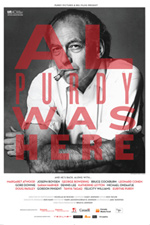

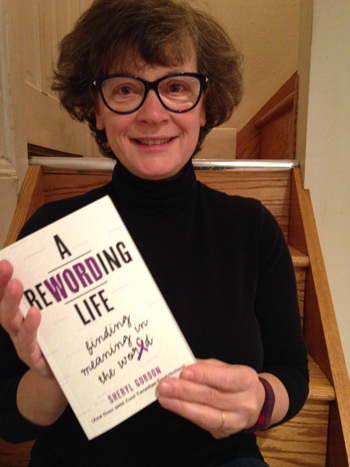 Many of the contributors are well known, including Yann Martel, Terry Fallis, Miriam Toews, Measha Brueggergosman, Tony Dekker, Emma Donoghue, Joel Plaskett and many more. Some of the contributors are, well, folks like me. Like many, I have family and friends who have been affected by dementia, so it feels particularly gratifying to try to strike back at it with the power of words.
Many of the contributors are well known, including Yann Martel, Terry Fallis, Miriam Toews, Measha Brueggergosman, Tony Dekker, Emma Donoghue, Joel Plaskett and many more. Some of the contributors are, well, folks like me. Like many, I have family and friends who have been affected by dementia, so it feels particularly gratifying to try to strike back at it with the power of words.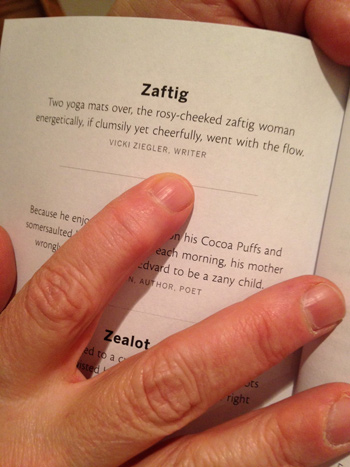
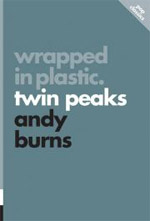 This slim collection of essays is an infectious appreciation of arguably (well, you get no argument from me) one of the most influential and defining creations ever to come out of television, the David Lynch / Mark Frost collaboration Twin Peaks. Author and pop culture aficionado Andy Burns (editor-in-chief of pop compendium web site
This slim collection of essays is an infectious appreciation of arguably (well, you get no argument from me) one of the most influential and defining creations ever to come out of television, the David Lynch / Mark Frost collaboration Twin Peaks. Author and pop culture aficionado Andy Burns (editor-in-chief of pop compendium web site 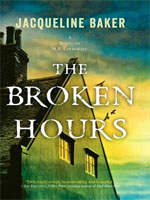
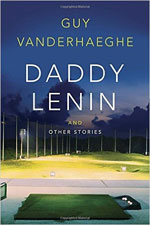
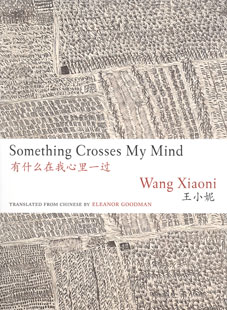 How do you read a poetry collection?
How do you read a poetry collection?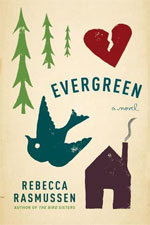
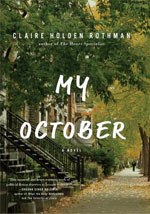 Claire Holden Rothman reimagines Hugh MacLennan’s Canadian literature classic Two Solitudes through the eyes and voices of an extended family touched in various ways by Quebec’s October Crisis. Rather than using her characters as symbols and thematic representations, however, Rothman creates palpably believable human beings touched by social, political and cultural forces, not just those buffeting Quebec in the 1970s, but reaching back to World War II. Beyond those external forces and influences, other connections and secrets are interwoven in the lives of prominent francophone author Luc Levesque, his wife Hannah, who is also the English translator of his works, and their troubled teenage son Hugo. There is an imperative tone to the “My” in the book’s title, driving home that what has happened in this pivotal month affects each character very differently, tests their strength and resourcefulness as individuals and challenges them collectively as a family.
Claire Holden Rothman reimagines Hugh MacLennan’s Canadian literature classic Two Solitudes through the eyes and voices of an extended family touched in various ways by Quebec’s October Crisis. Rather than using her characters as symbols and thematic representations, however, Rothman creates palpably believable human beings touched by social, political and cultural forces, not just those buffeting Quebec in the 1970s, but reaching back to World War II. Beyond those external forces and influences, other connections and secrets are interwoven in the lives of prominent francophone author Luc Levesque, his wife Hannah, who is also the English translator of his works, and their troubled teenage son Hugo. There is an imperative tone to the “My” in the book’s title, driving home that what has happened in this pivotal month affects each character very differently, tests their strength and resourcefulness as individuals and challenges them collectively as a family.